Issue 22 • 2025
-
Editorial | Issue 22Download
As I looked at the papers in this 2025 issue of Perspectivas, it became evident that we—Latinas/os/xs—have made our mark on all levels of theological education. Whether from the positions of Presidents, Chief Executive Officers, or Chief Academic Officers/Deans, these scholars showcase the growing number of Latina/o/x voices shaping the future of theological education. Latinas/os/xs now boast of several organizations supporting theological and religious education, including the Hispanic Theological Initiative (HTI), the Association for Hispanic Theological Education (AETH), the Hispanic Scholars Program (HSP, formerly known as the Hispanic Summer Program), the Academy of Catholic Hispanic Theologians in the US (ACTHUS), and La Comunidad of Hispanic Scholars of Religion. These organizations often work together to support new generations of Latina/o/x scholars.
Read MoreCollapseThe papers also demonstrate how much further we must go. In a time of shrinking resources and closing theological educational institutions, these scholars in leadership represented in this issue of Perspectivas help us envision a more solid future for our communities. The challenges ahead are great, and increasing the number of Latina/o/x scholars of religion and theology will be a monumental task. Yet, the authors in this issue model the possibilities of aspiring to the highest levels of governance in academic institutions without compromising their commitment to our communities or abandoning their own sense of vocation to serve. Some of these authors also demonstrate that for Latinas/os/xs, the academy is an extension of our struggles at the grassroots. Entering high levels of leadership does not mean reproducing the prestige of the idyllic ivory tower disconnected from the reality of Latina/o/x communities. Instead, it means remaining connected with the broader communities of Latinas/os/xs who continue to experience discrimination, persecution, and marginalization.
It took some time to collect all the papers, and now I want to take this opportunity to express my gratitude to the three guest editors: Luis R. Rivera-Rodríguez, Joanne Rodríguez, and David Vásquez-Levy. All the addresses are provided in the language in which they were first delivered. Since the speeches by Doris García and Juan Ramón Mejías Ortiz were originally delivered in Spanish, they have been translated into English. This collection of articles invites us to raise the proverbial glass and make a toast for the collective and individual achievements of these Latina/o/x scholars. I am deeply proud of what our peers can, and have, accomplished despite the social and political pressures that wish to keep us in positions of social servitude.
Néstor Medina and the Editorial team
Articles
-
Abstract:
This special edition of Perspectivas memorializes and celebrates the recent growth of Hispanic-Latine presidential officers in Protestant, Catholic, and Evangelical schools affiliated with the Association of Theological Schools (ATS).[1] We invited these leaders to share their inaugural speeches or
Read MoreCollapse / Download Issueearly statements to their academic communities. The purpose of this exercise is to document three things: first, their professional and personal achievements; second, a later phase in the development of the Hispanic-Latine movement in theological education; and, finally, the transformative work that the Hispanic-Latine movement and members of others minoritized groups, have conducted within the establishment of graduate theological education in ATS schools.
[1] All the presidents and deans included in this publication were “presidential leaders” in their schools. The deans we included, contrary to other academic or faculty deans, had the responsibilities and roles of “president.” This function was the criterion for including their speeches in this collection.
Resumen:Esta edición especial de Perspectivas conmemora y celebra el crecimiento en tiempos recientes de líderes presidenciales hispano-latiné en las escuelas protestantes, católicas y evangélicas afiliadas a la Asociación de Escuelas Teológicas (ATS).[1] Invitamos a estos líderes a compartir sus discursos
Leer MásLeer Menos / Descargar este ejemplarinaugurales o sus primeras declaraciones a sus comunidades académicas. El propósito de este ejercicio es documentar tres cosas: primero, sus logros profesionales y personales; en segundo lugar, una fase posterior en el desarrollo del movimiento hispano-latiné en la educación teológica; y, finalmente, el trabajo transformador que el movimiento hispano-latiné, y miembros de otros grupos minoritarios, han llevado a cabo dentro del establecimiento de la educación teológica de posgrado en las escuelas de la ATS.
[1] Todos los presidentes y decanos incluidos en esta publicación eran “líderes presidenciales” en sus escuelas. Los decanos que incluimos, a diferencia de otros decanos académicos o de facultad, tenían las responsabilidades y funciones de “presidente.” Esta función fue el criterio para incluir sus discursos en esta colección.
-
 Abstract:Resumen:
Abstract:Resumen: -
 Abstract:Resumen:
Abstract:Resumen: -
 Abstract:Resumen:
Abstract:Resumen: -
 JAVIER VIERA, “A Case for Abundant Christian Life.” (Oct. 16, 2014)Abstract:
JAVIER VIERA, “A Case for Abundant Christian Life.” (Oct. 16, 2014)Abstract:
By Rev. Dr. Javier Viera (Methodist, UMC)The author is concerned with the ability of the Christian life and theological education to face the challenges that religious traditions confront in the contemporary world. Inspired by the work of historian David Hempton on reform Christian movements, such as the Jesuits, Pietists, and
Read MoreCollapse / Download IssueMethodists, Viera adopts and promotes a few aims to guide the renewal of theological education today. These are: develop a dynamic spiritual life; engage in mission work that fosters diversity and adapts the Christian message to honor diverse peoples and cultures; work with a transformative agenda for social justice in solidarity with poor and marginalized people; and form well educated religious leaders capable of thinking critically and creatively to address the issues and signs of the times. The fate of Christianity and theological education depends on presenting “a compelling vision of abundant life, of compassionate life to a violent and fragmented world.”
JAVIER VIERA, “A Case for Abundant Christian Life.” (Oct. 16, 2014)Resumen:
Por Rev. Dr. Javier Viera (Methodist, UMC) -
 DORIS GARCIA RIVERA, “With Another Dress, With Another Skin.” (Nov. 8, 2014)Abstract:By Rev. Dr. Doris J. García Rivera (Baptist, ABC)
DORIS GARCIA RIVERA, “With Another Dress, With Another Skin.” (Nov. 8, 2014)Abstract:By Rev. Dr. Doris J. García Rivera (Baptist, ABC)The author retrieves and claims the Christian identity as “followers or disciples of Jesus”, or as “wearing Jesus Christ,” as a countercultural and liberating socio-spiritual identity to be affirmed for the sake of becoming a life-giving and liberating church and theological school amidst identities,
Read MoreCollapse / Download Issuesystems, and relationships that “dress up people with identities” that produce death and oppressions in today’s world. With Evangelical and metaphorical language, she calls to “take off” the “clothes or identities of social systems that dress us with clothes-identities that are contrary to God’s ways, and to let God “to dress us up with Jesus Christ,” as Godself did in the incarnation. Theological education, at its best, challenges the dehumanizing clothes-identities of social systems and helps us to wear Christ or priestly clothes congruent with God’s reign and its “integral freedom – emotional, physical, social, economic, political, and religious.”
DORIS GARCIA RIVERA, “Con Otro Vestido, Con Otra Piel.” (8 de noviembre, 2014)Resumen:Por Rvda. Doris J. García Rivera, Ph.D. (Baptist, ABC) -
 DAVID VÁZQUEZ-LEVY, “Investing in the Future. President´s Response.” (Jan. 29, 2015)Abstract:
DAVID VÁZQUEZ-LEVY, “Investing in the Future. President´s Response.” (Jan. 29, 2015)Abstract:
By Rev. Dr. David Vázquez-Levy (Lutheran, ELCA)Acknowledging the twin crises facing the church and higher education, the author calls for courageous action in theological education. Using Jeremiah’s risky real-estate investment in a plot of land in Anatoth amid crisis, Vasquez-Levy sees the opportunity to leverage the legacy and
Read MoreCollapse / Download Issuecontext of the Pacific School of Religion to invest in those whose very marginality has sharpened their ability to innovate. Making the case that there is an extensive need for spiritually rooted leadership in the world, he reframes the financial and enrollment challenges of schools as being less about resources and more about access. He weaves voices from Scripture, history, academy, and culture to ask “Amid all the uncertainty God will continue to raise leaders that can bring about God’s dream and vision for the world. What role will we play? Where will we invest?”
DAVID VÁZQUEZ-LEVY, “Investing in the Future. President´s Response.” (Jan. 29, 2015)Resumen:
Por Rev. Dr. David Vázquez-Levy (Lutheran, ELCA) -
 RAÚL GÓMEZ-RUIZ, “Sacred Heart Seminary and School of Theology: Your Seminary.” (Aug. 19, 2019)Abstract:
RAÚL GÓMEZ-RUIZ, “Sacred Heart Seminary and School of Theology: Your Seminary.” (Aug. 19, 2019)Abstract:
By Rev. Dr. Raúl Gómez-Ruiz, SDS (Roman Catholic)The author reflects on a long-standing experience of leadership service to the school for over 24 years and presents himself as a “dreamer” with a dream of Sacred Heart as a place “full of prestige that enjoys national and international fame for its superb theological, spiritual,
Read MoreCollapse / Download Issuepastoral, and human formation, and as a holy place, where the world meets to encounter and extend the reign of God.” The embodiment of this dream will require several efforts: first, the reaffirmation of its “SCJ charism and Dehonian spirituality” in its life and purpose”; second, the clarity to name the expected core ways of being and working of those graduates connected to the spiritual, intellectual, pastoral, and human formation aims; third, administrative practices that are collaborative and based on the principle of subsidiarity; fourth, the creation of new administrative structures and educational programs.
RAÚL GÓMEZ-RUIZ, “Sacred Heart Seminary and School of Theology: Your Seminary.” (Aug. 19, 2019)Resumen:
Por Rev. Dr. Raúl Gómez-Ruiz, SDS (Roman Catholic) -
 ELÍAS ORTEGA-APONTE, “Presidential Priorities” (Oct. 26, 2019)Abstract:
ELÍAS ORTEGA-APONTE, “Presidential Priorities” (Oct. 26, 2019)Abstract:
By Dr. Elías Ortega-Aponte (Unitarian Universalist)Grounding his reflections on Meadville Lombard’s faith tradition and legacy, the author speaks to the distinctive contribution of the school in a time of uncertainty. He states that over the 175-year history of the school, “in times of challenge, [Meadville Lombard Theological School] has
Read MoreCollapse / Download Issueanchored its hope in future possibilities.” He calls on the community to rise to the challenges and seize the opportunities of this moment. He highlights the intentional connection between theory and practice that marks the school’s curriculum, which gives rise to the core leadership skills which “theological education contributes to our civic lives equipping religious communities, lay members, and religious leaders with a moral vision necessary to justice-making work in the world and lives of service in the public sphere.”
ELÍAS ORTEGA-APONTE, “Presidential Priorities” (Oct. 26, 2019)Resumen:
Por Dr. Elías Ortega-Aponte (Unitarian Universalist) -
 ALFREDO I. HERNÁNDEZ, “FIAT: Not Just the Pope’s Car!” (Sept. 9, 2020)Abstract:
ALFREDO I. HERNÁNDEZ, “FIAT: Not Just the Pope’s Car!” (Sept. 9, 2020)Abstract:
By V. Rev. Dr. Alfredo I. Hernández (Roman Catholic)Reflecting personally on his own vocation story, the author highlights the centrality of God’s invitation and our response to be part of the healing of the world. He connects individual vocation to the vocation of the seminary and the church by
Read MoreCollapse / Download Issueexploring the rich use of the phrase “let it be” or “let it be done”—Fiat in Latin—in the New Testament. The gathered community, and through them the broader church, are challenged to be willing, like Mary, to bear Christ to the world, to mirror Jesus’ willingness to embrace the grief of the world, and to pray each day as Jesus taught us, “thy will be done.” Acknowledging the particularly challenging moment marked by pandemic and crisis, a faithful vision emerges “not because we’re so impressive in our faithfulness but because we know God will always be faithful to us.”
ALFREDO I. HERNÁNDEZ, “FIAT: Not Just the Pope’s Car!” (Sept. 9, 2020)Resumen:
Por V. Rev. Dr. Alfredo I. Hernández (Roman Catholic) -
 JUAN R. MEJÍAS ORTÍZ, “New Beginnings; Old Challenges.” (Aug. 28, 2021)Abstract:By Rev. Dr. Juan R. Mejías Ortíz (Disciple of Christ, CC)
JUAN R. MEJÍAS ORTÍZ, “New Beginnings; Old Challenges.” (Aug. 28, 2021)Abstract:By Rev. Dr. Juan R. Mejías Ortíz (Disciple of Christ, CC)This pastoral reflection is about an interim president who, after serving for two years, is now inaugurated as acting president. He declares his identity and trajectory as a pastoral leader serving the church and the Seminary. He narrates the ways things have changed to address the
Read MoreCollapse / Download Issueinstitutional and financial crisis during the COVID era. The author reaffirms the history, role, and mission of the seminary as a school for and of the church for the formation of ministers and ministry committed to the liberating power of the Gospel, and as a forum for open dialogue and research. He calls for unity between the Seminary and the Church, and as well as between Christians of different orientations. He discusses the renewal of academic programs, educational technology, and the aspiration for a research center. Finally, the author expresses humbly his collaborative leadership style and requests support in fulfilling a call to become a president-pastor for the Seminary.
JUAN R. MEJÍAS ORTÍZ, “Nuevos Comienzos, Viejos Desafíos.” (28 de agosto, 2021)Resumen:Por Rev. Dr. Juan R. Mejías Ortíz (Disciple of Christ, CC) -
 EDGARDO A. COLÓN-EMERIC, “A New Pentecost.” (Aug. 31, 2021)Abstract:
EDGARDO A. COLÓN-EMERIC, “A New Pentecost.” (Aug. 31, 2021)Abstract:
By Rev. Dr. Edgardo Colón-Emeric (Methodist, UMC)In this sermon, the author calls Duke Divinity School to be open and ready for a new Pentecost that is “pressing, possible, and promised.” Using the biblical texts of Babel and Pentecost, the author explores imaginatively a contrast between the world according to Babel and according
Read MoreCollapse / Download Issueto Pentecost. Ultimately, the author longs “for our academic and vocational formation to be known for cultivating a Pentecost vision of God, the church, and the world.” Can there be a new Pentecost at Duke Divinity School? It is possible if all in the school commit to affirming the Spirit’s winds for a) affirming the goodness of human diversities, b) connecting learning and scholarship to the lives and struggles of people in the many peripheries and margins in the world, and c) raising our students high as the “sails” where the Spirit blows during this age of COVID pandemic.
EDGARDO A. COLÓN-EMERIC, “A New Pentecost.” (Aug. 31, 2021)Resumen:
Por Rev. Dr. Edgardo Colón-Emeric (Methodist, UMC) -
 BRIAN LUGIOYO, “Treasures Old and New: The Danger of Hell for Theologians.” (Sept. 9, 2021)Abstract:
BRIAN LUGIOYO, “Treasures Old and New: The Danger of Hell for Theologians.” (Sept. 9, 2021)Abstract:
By Rev. Dr. Brian Lugioyo (Methodist, FMC)The author engages with a rich set of parables and images to beautifully articulate the critical importance and responsibility of theological education. Recognizing the power of words to shape community and imagination, he calls on his colleagues and community to take seriously
Read MoreCollapse / Download Issuetheir “scribal” task of balancing the new and the old. He states that “the great temptation of theological education is to focus on one or the other: the old at the cost of the new, or the new at the cost of the old.” Challenging the community to move beyond the binary of nostalgia and novelty, he articulates the work of theological educators at a time of great disruption as being scribes of the kingdom who take the conjunction “and” seriously drawing on the wisdom of tradition and embracing the possibilities of change.
BRIAN LUGIOYO, “Treasures Old and New: The Danger of Hell for Theologians.” (Sept. 9, 2021)Resumen:
Por Rev. Dr. Brian Lugioyo (Methodist, FMC) -
 Abstract:
Abstract:This theological reflection centers around a confession and a call for “unrelenting hope” to claim and re-live in our times the “spiritual and institutional DNA” or identity that has
Read MoreCollapse / Download Issuecharacterized the seminary since its foundations, that is, its vocation to be and to serve at the margins. It is a vision and practice of ministry and theological education grounded in Jesus’ liberating and affirming ministry to marginal and poor people. “My unrelenting hope and vision for Garrett-Evangelical is that… we are a community unapologetically claimed and identified by the Spirit of Jesus… we will equip leaders to grow and thrive in spreading hope at the margins and wherever distorted versions of humanity and themselves grip people. Garrett is called to be both a mirror so that distortion can be exposed, and also the bearer of the gift of wholeness and flourishing that Jesus promised.”
Resumen: -
 GERSON MORENO-RIAÑO, “Cornerstone University and Cornerstone Theological Seminary. The Destination of Choice.” (Oct. 23, 2021)Abstract:
GERSON MORENO-RIAÑO, “Cornerstone University and Cornerstone Theological Seminary. The Destination of Choice.” (Oct. 23, 2021)Abstract:
By Dr. Gerson Moreno-Riaño (Independent Baptist)The author seeks to unite and help the Cornerstone community to focus on the historic opportunity for Cornerstone University and Cornerstone Theological Seminary to arise and become the destination of choice for Christian Higher Education. “And my vision, our vision for
Read MoreCollapse / Download Issuethis wonderful, great university called Cornerstone University, is to have a Cornerstone graduate in every household of America.” He delineates a vision and the qualities needed to achieve this goal and its impact. He calls the university and seminary to show “great moral courage proclaiming and defending… The faith of Jesus and the gospel;” “to be a beautiful community that mirrors the kingdom of God” in accepting diversity in hospitable ways; to be committed to “truth and not ideologies” and to practice holistic spiritual formation.
GERSON MORENO-RIAÑO, “Cornerstone University and Cornerstone Theological Seminary. The Destination of Choice.” (Oct. 23, 2021)Resumen:
Por Dr. Gerson Moreno-Riaño (Independent Baptist) -
 JOSÉ I. IRIZARRY, “A Widening Place.” (Nov. 12, 2022)Abstract:
JOSÉ I. IRIZARRY, “A Widening Place.” (Nov. 12, 2022)Abstract:
By Rev. Dr. José I. Irizarry (Presbyterian, PCUSA)The author calls the Austin Seminary to celebrate, re-examine its history, and lament what has perished without feeling defeated or abandoned. He beacons the question: “What is this place of learning and faith we call Austin Presbyterian Theological Seminary? He quotes
Read MoreCollapse / Download IssueMartin Heidegger, “We ought to be keenly aware of our (Dasein) “being there” of our place as prophetic voice amid unjust systems of exclusion and oppression. He uses the term immigrant imagination to exhort the community to ponder what it means to find a place of belonging in our world, especially when at times it is indifferent, self-preoccupied, and unhospitable. To be aware of this place, Austin Seminary, and to listen to the wisdom of the apostle in Ephesians, who invites us to be rooted and established in love so that we may be empowered to grasp another model of dimensionality, not measured solely in numbers, but on how wide and long and high and deep is the love of the one we seek to emulate in all forms of service. Calling the seminary to teach new generations of Christians and listening to the faith of Millennials, Gen Z’s, Gen Alphas, and those who will follow, in whatever form that faith is emerging should start to inform Austin’s curriculum now. He exhorts the seminary to plant seeds that will sustain people in the continuum of theological learning which begins before seminary education and continues after they leave the classroom. Making Austin a place of cultivation, a widening place seeking out special gifts for service within the church and helping them discern such passions that may signal a vocation for ministry.
JOSÉ I. IRIZARRY, “A Widening Place.” (Nov. 12, 2022)Resumen:
Por Rev. Dr. José I. Irizarry (Presbyterian, PCUSA) -
 VICTOR ALOYO JR., “In Abundance and Grace.” (Nov. 12, 2022)Abstract:
VICTOR ALOYO JR., “In Abundance and Grace.” (Nov. 12, 2022)Abstract:
By Rev. Dr. Víctor Aloyo, Jr. (Presbyterian, PCUSA)In this presidential address Rev. Dr. Aloyo calls Columbia Seminary to start a new day in abundance and grace and not scarcity and fear. He uses both Isaiah 55:1-9 and Revelations 22:1-5 to say that God’s affirmations of abundance and grace are pushing, in fact, demanding that Colombia re-engage
Read MoreCollapse / Download Issueboth locally and in communities abroad in new ways. Making Columbia an institution where all feel welcomed and included, where candid conversations and vigorous debates can be had. Harnessing the power of the institutional human and financial capital in collaboration with civic partners, foundations, government agencies, and corporations to create and learn new knowledge, invest collaboratively, and apply resources to critical needs. It requires an approach that spans multiple disciplines, a mindset that embraces collaboration, and, yes, the funding and philanthropic support necessary to succeed.
VICTOR ALOYO JR., “In Abundance and Grace.” (Nov. 12, 2022)Resumen:
Por Rev. Dr. Víctor Aloyo, Jr. (Presbyterian, PCUSA) -
 Abstract:
Abstract:The author references two murals found in small town of Lavapiés in Spain, the first with the wording “Usted Está Aquí” (you are here) to bring attention to the current situation in theological education and the negative and discouraging narratives like declining enrollment and
Read MoreCollapse / Download Issuedecreasing interest in all types of organized religion. He is mindful that these are real and can’t be ignored, and he calls Drew University to reflect as Easter approaches how millions are still preparing in the season of Lent and how even the so-called Religions Nones are deeply committed to values like tolerance, and engaged in serving communities, work in social, economic, environmental justices to build vital healthy, stable, and caring societies. He points to research that shows that the vast majority of the world’s people will continue to identify with a religion. He then references the late Eduardo Galeano (1940-2015, an author, poet and journalist from Uruguay, and the mural art with the wording, “Somos lo que hacemos para cambiar lo que somos” (We are what we do in order to change what we are) as well as Micah chapter 6, and begs the question, “Now what?” Will Drew University revisit its mission and vision and be creative and take courageous action to advance justice, peace and love of God, neighbor, and the earth? He responds by saying, “Yes, we can do this because we have this within us collectively.”
Resumen:
HTI Book Reviews
-
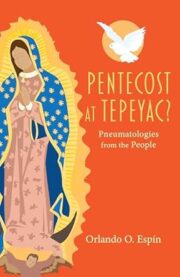 Pentecost at Tepeyac?: Pneumatologies from the People, By Orlando O. Espín. Orbis Books, 2024. 148 pages. $27.00.
Pentecost at Tepeyac?: Pneumatologies from the People, By Orlando O. Espín. Orbis Books, 2024. 148 pages. $27.00.
Orlando O. EspínHéctor Varela Rios
Villanova University -
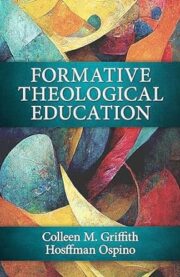 Formative Theological Education, Edited by Colleen M. Griffith and Hosffman Ospino. Paulist Press, 2023. 151 pages. $27.95
Formative Theological Education, Edited by Colleen M. Griffith and Hosffman Ospino. Paulist Press, 2023. 151 pages. $27.95
Francisco Castillo
Loyola University -
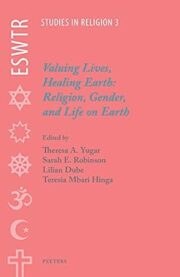 Valuing Lives, Healing Earth: Religion, Gender, and Life on Earth, Eds., Theresa A. Yugar, Sarah E. Robinson, Lilian Dube and Teresia Hinga. Peeters 2021. $69.
Valuing Lives, Healing Earth: Religion, Gender, and Life on Earth, Eds., Theresa A. Yugar, Sarah E. Robinson, Lilian Dube and Teresia Hinga. Peeters 2021. $69.
MiKayla Hamilton
Emory University -
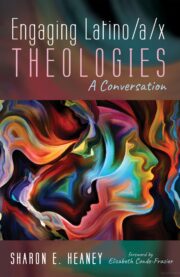 Engaging Latino/a/x Theologies: A Conversation, By Sharon E. Heaney. Cascade Books, 2024. 204 Pages. $27.00.
Engaging Latino/a/x Theologies: A Conversation, By Sharon E. Heaney. Cascade Books, 2024. 204 Pages. $27.00.
Luis Tapia Rubio
Anabaptist Mennonite Biblical Seminary -
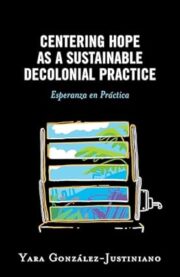 Centering Hope as a Sustainable Decolonial Practice: Esperanza en Práctica, By Yara González-Justiniano. Lexington Books; 2022. 183 pages. $39.99.
Centering Hope as a Sustainable Decolonial Practice: Esperanza en Práctica, By Yara González-Justiniano. Lexington Books; 2022. 183 pages. $39.99.
Yaheli Vargas-Ramos
Drew University -
 Cornerstones: Sacred Stories of LGBTQ+ Employees in Catholic Institutions, Edited by Ish Ruiz and Mark Guevarra. New Ways Ministry, 2024. 152 pages. $24.95.
Cornerstones: Sacred Stories of LGBTQ+ Employees in Catholic Institutions, Edited by Ish Ruiz and Mark Guevarra. New Ways Ministry, 2024. 152 pages. $24.95.
Leonardo Daniel Mendoza
Loyola University Chicago

